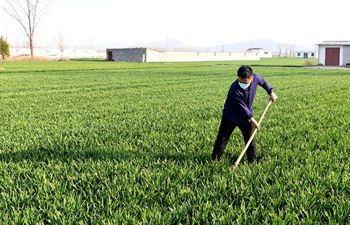CHICAGO, Feb. 21 (Xinhua) -- A study involving male zebra finches from the University of Chicago (UChicago) shows evidence that the intrinsic, built-in properties of the cells themselves, not just the connections between neurons, also play a role in the process of learning.
In the study posted on UChicago's website on Wednesday, the researchers recorded the patterns of action potential spikes from zebra finch neurons at different stages of development: adult birds with fully developed song patterns and juveniles that were still learning.
They then devised a mathematical way to compare how closely the intrinsic properties of two given birds matched each other. When the researchers made a similar calculation of how closely their songs resembled each other, they came to a striking conclusion.
"When we did that calculation for the birds, we found that birds that were close in terms of their intrinsic properties also had similar songs," said the study's senior author Dan Margoliash.
This relationship held up across different pairings of birds as well. Sibling adult birds that were raised by the same parents, and thus taught the same way, had both similar songs and intrinsic cell properties. But juvenile birds that hadn't yet perfected their songs were all over the map. There were no clear relationships between the intrinsic cell properties of the juveniles and their songs, no matter how they were related.
The researchers further found that using a device that recorded the birdsong and played it back at a slight delay caused the birds to alter their song patterns in a way that resembles stuttering in humans. They immediately got stuck trying to start to sing. Eventually such birds would get stuck on certain notes, or repeated patterns that they wouldn't produce in a natural environment.
What is interesting is that this same technique can induce stuttering in people too. If a speaker listens to a slightly delayed feed of their own voice, it will cause them to trip over words and repeat syllables.
"There certainly are important cognitive components of stuttering that we haven't had a chance to study yet and see how useful the birdsong model is," Margoliash said, "but at the fundamental level we can study the neural basis of that behavior precisely. Having an animal model for stuttering could be a major breakthrough."
The study has been published in Nature Communications.

















